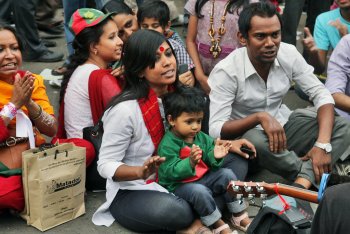By Isabel Ortiz

In recent years the world has been shaken by protests. From the Arab Spring to the “Indignados”
(outraged), from Occupy to food riots. There have been periods in history when large numbers of people
rebelled about the way things were, demanding change, such as in 1848, 1917 or 1968; today we are
experiencing another period of rising outrage and discontent, and some of the largest protests in world
history.
The main grievances and causes of outrage are:
_ - Economic Justice and Anti-Austerity: 488 protests on issues related to reform of public services,
tax/fiscal justice, jobs/higher wages/labor conditions, inequality, poverty/low living standards,
agrarian/land reform, pension reform, high fuel and energy prices, high food prices, and housing.
_ - Failure of Political Representation and Political Systems: 376 protests on lack of real democracy;
corporate influence, deregulation and privatization; corruption; failure to receive justice from the
legal system; transparency and accountability; surveillance of citizens; and anti-war/military
industrial complex.
_ - Global Justice: 311 protests were against the IMF and other International Financial Institutions
(IFIs), for environmental justice and the global commons, and against imperialism, free trade and
the G20.
_ - Rights of People: 302 protests on ethnic/indigenous/racial rights; right to the Commons (digital,
land, cultural, atmospheric); labor rights; women’s rights; right to freedom of
assembly/speech/press; religious issues; rights of lesbian/gay/bisexual/transgendered people (LGBT); immigrants’ rights; and prisoners’ rights. A lesser number of protests focus on denying
rights to specific groups (eg. immigrants, gays).
Although the breadth of demand for economic justice is of serious consequence, the most sobering
finding of the study is the overwhelming demand (218 protests), not for economic justice per se, but for
what prevents economic issues from being addressed: a lack of “real democracy”, which is a result of
people’s growing awareness that policy-making has not prioritized them—even when it has claimed to—
and frustration with politics as usual and a lack of trust in the existing political actors, left and right. This
demand and the crisis of political representation it expresses is coming from every kind of political
system, not only authoritarian governments but also representative democracies which are failing to
listen to the needs and views of ordinary people.
A profile of demonstrators reveals that not only traditional protesters (eg. activists, unions) are
demonstrating; on the contrary, middle classes, youth, older persons and other social groups are actively
protesting in most countries because of lack of trust and disillusionment with the current political and
economic system. They are increasingly joining activists from all kinds of movements, not only in marches
and rallies (the most common methods of civil protest, in 437 events), but in a new framework of protest
that includes civil disobedience and direct actions such as road blockages and occupations of city streets
and squares to raise awareness about their demands (a total of 219 occupations of public spaces). The
period covered by this study also captures the advent of a new era of civil disobedience/direct action
carried out by computer hackers and whistleblowers who “leak” massive amounts of government and
corporate data. Contrary to public perception, violence and vandalism/looting appear in only 75 events,
or 8.9% of world protests. Though only used by a few, 33 events record desperate methods such as
hunger strikes and self-inflicted violence (eg. self-immolation or protesters sewing their own lips).
Who do protesters oppose? An analysis of main protests in the period 2006-2013 shows that
demonstrators mostly address their grievances to national governments, as they are the legitimate
policy-making institutions that should respond to citizens. Protestors demand that policy-makers take
public responsibility for economic, social and environmental policies—that should benefit all, instead of
just the few. However, protests against the inadequate political and economic system appear second in
importance, reflecting significant discontent with the working of current democracies and demands for
real democracy. Protestors further oppose (by order): corporations/employers, the IMF, elites, the
financial sector, the ECB, military and police forces, free trade, economic/military powers (eg. EU, US,
China), the G20, the World Bank, specific political parties, some social groups (eg. migrants, homosexuals,
gypsies) and, in some cases, religious authorities.
The set of policies needed at the national and global levels to address the grievances described in this
paper cross over virtually every area of public policy, from jobs, public services and social protection to
taxation, debt and trade. Governments need to listen to the messages coming from protesters. However,
policy reforms will be insufficient if governments fail to guarantee democratic participation and curtail
the power of elites—not only in local and national governments but in the institutions of global
governance as well. Leaders and policymakers will only invite further unrest if they fail to prioritize and
act on the one demand raised in more of the world’s protests between 2006 and 2013 than any other—
the demand for real democracy.
This study analyzes 843 protests occurring between January 2006 and July 2013 in 87
countries covering over 90% of world population. The paper focuses on: (i) major grievances driving world
protests (ii) who is demonstrating, what protest methods they use, and who are they opposed to (iii)
achievements and repression of social movements in the short term, and (iv) the main policy demands of
world demonstrators. The paper calls for policy-makers to listen, whether messages are articulate or
communicate only through frustration and violence.